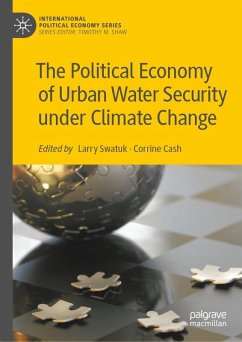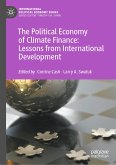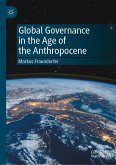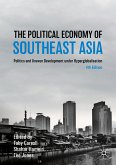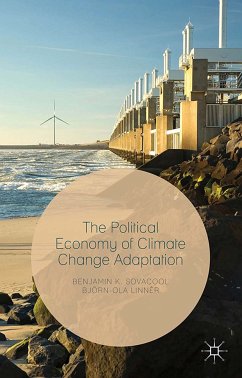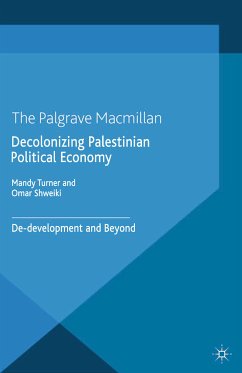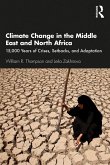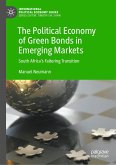In 2018, the city of Cape Town faced the prospect of reaching 'day zero', that is a combination of natural and human-made factors leading to the complete collapse of its municipal water supply. While the rains eventually fell and a major disaster was averted, the fear of running out of water looms large in the psyche of residents in many cities around the world. Water is a non-substitutable, essential, finite and fugitive resource. It is the lifeblood of human endeavour. Cities, through global processes such as Agenda 2030 and forums such as ICLEI exchange best practices for achieving water security. These forums also are collective social spaces occupied by civil society organizations who share strategies and tactics, and the private sector, who compete for markets and contracts, promoting patent-protected technologies. It is these groups - states, civil societies, private sectors - coming together who determine who gets what water, when, and where. It is the job of academics to understand the how and why, and of (academic-)activists to fight for equity of access and sustainability of use. Evidence drawn from around the world and over time consistently shows that water flows toward money and power. Outcomes are too-often socially inequitable, environmentally unsustainable and economically inefficient. How to shift existing processes toward improved practices is not clear, but positive outcomes do exist. In this collection, we compare and contrast the challenges and opportunities for achieving urban water security with a focus on 11 major world cities: Bangalore, Beijing, Cairo, Cape Town, Chennai, Istanbul, Jakarta, London, Melbourne, Sao Paulo and Tokyo. Through the theoretical, conceptual and practical insights provided in these case studies, our collection constructively contributes to a global conversation regarding the ways and means of 'avoiding day zero'.
Larry Swatuk is Professor of Development Studies at the University of Waterloo, Canada. He is also Extraordinary Professor in the Institute for Water Studies at the University of the Western Cape in South Africa. He has lived and worked in different parts of Africa over more than 37 years beginning with a 6 month visit to Lesotho in 1984. Between 1989-96 he was a Research Fellow, National University of Lesotho; Visiting Scholar, University of Swaziland; Post-Doctoral Fellow, Rhodes University; and Senior Research Fellow at ACDESS in Nigeria. From 1996-2007 he was a Lecturer in Politics and Associate Professor of Natural Resources Governance at the University of Botswana. Currently, His research focuses primarily on freshwater governance and management in the Global South.
Corrine Cash is an Assistant Professor of Planning and Community Climate Adaptation in the Department of Geography and Environment at Mount Allison University in Sackville, New Brunswick, Canada.
Larry Swatuk is Professor of Development Studies at the University of Waterloo, Canada. He is also Extraordinary Professor in the Institute for Water Studies at the University of the Western Cape in South Africa. He has lived and worked in different parts of Africa over more than 37 years beginning with a 6 month visit to Lesotho in 1984. Between 1989-96 he was a Research Fellow, National University of Lesotho; Visiting Scholar, University of Swaziland; Post-Doctoral Fellow, Rhodes University; and Senior Research Fellow at ACDESS in Nigeria. From 1996-2007 he was a Lecturer in Politics and Associate Professor of Natural Resources Governance at the University of Botswana. Currently, His research focuses primarily on freshwater governance and management in the Global South.
Corrine Cash is an Assistant Professor of Planning and Community Climate Adaptation in the Department of Geography and Environment at Mount Allison University in Sackville, New Brunswick, Canada.
Dieser Download kann aus rechtlichen Gründen nur mit Rechnungsadresse in A, B, BG, CY, CZ, D, DK, EW, E, FIN, F, GR, HR, H, IRL, I, LT, L, LR, M, NL, PL, P, R, S, SLO, SK ausgeliefert werden.
Es gelten unsere Allgemeinen Geschäftsbedingungen: www.buecher.de/agb
Impressum
www.buecher.de ist ein Internetauftritt der buecher.de internetstores GmbH
Geschäftsführung: Monica Sawhney | Roland Kölbl | Günter Hilger
Sitz der Gesellschaft: Batheyer Straße 115 - 117, 58099 Hagen
Postanschrift: Bürgermeister-Wegele-Str. 12, 86167 Augsburg
Amtsgericht Hagen HRB 13257
Steuernummer: 321/5800/1497
USt-IdNr: DE450055826

